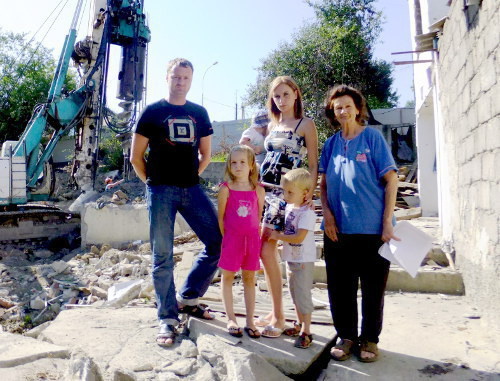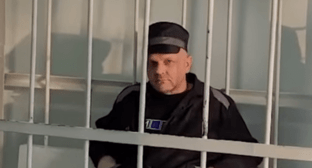
27 December 2011, 21:00
Sochi: after house demolition, large family moves to garage in cemetery
The large family of Revenko from Sochi is forced to live in a garage in the cemetery after demolition of their house, which was done to break the ground for building a road junction.
The "Caucasian Knot" has reported that in winter the large Revenko family found themselves in the street with their small children. As reported by the family members, for almost six months already they have been living in a cemetery in a garage unfit for living. The authorities fail to react to their applications asking to provide them with housing instead of their demolished house. Officials and the court refuse to grant them with housing, despite the fact that all the members of this family were registered at the demolished house No. 10 in Makarenko Street; moreover, they were born in it.
In August in Sochi, during demolition of Nos. 8 and 10 in Makarenko Street, the authorities failed to provide housing to ten Sochi residents - the large Revenko family and the lonely 75-year-old pensioner Nadezhda Chubenko. Seven members of the Revenko family had lived in the demolished house since birth. In the opinion of local bureaucrats, the large family and the pensioner had no rights to get any accommodation instead of the demolished houses.
After publications of the "Caucasian Knot", the authorities reversed their decision; and the city administration granted social housing to Nadezhda Chubenko. However, the problems of the large family are still far from their resolution.
As reported by Roman Revenko, a family member, their house was demolished without a judicial decision.
"Renting an apartment for the whole family is about 25-50,000 roubles per month," he said. "We have no that money, as only two members of the family have jobs. We can pay only 8000 roubles per month at the most. We found s deserted garage in the vicinity of the cemetery; and we live - all nine of us - for six months already in its basement."
The "Caucasian Knot" correspondent reports that the garage has no natural illumination, no heating, no toilets and no water supply. The family takes water from the tap at the cemetery and cooks their meals on an electric stove; the whole family sleeps on the concrete floor.
Veronika Revenko, the mother of the smallest member of the family - Vadik, who is one year and two months old, said that it is very difficult to raise children in such circumstances. However, according to her story, none of the bureaucrats would even try to understand her.
"They say: get employed by the administration and earn social housing for you. But how can I work and earn the housing, when I have three small children on me?" she asked.
"When I asked the Mayor (Anatoly Pakhomov, - note of the "Caucasian Knot"), whether he was ready to hire us, he asked us to look for employment by ourselves. That is, the authorities are just pushing us away by offering unrealistic solutions to the problems they had set up for us. Our house was demolished; and nobody is now responsible. We had asked nothing from the state; we had our housing. However, if the state needed our house and ruined it, let the state provide us with what they had taken away from us," said Roman Revenko.
In response to the request of the "Caucasian Knot" about the grounds, on which the Revenko family was left without housing, Larissa Zavedeeva, the head of the Department of the Krasnodar Territory on Exercising the Powers of Preparing Winter Olympic Games of 2014, said the following:
"The house and the land had jointly belonged to S. Bondarenko, N. Chalin and L. Sorokina. Since the Revenko family members were not owners of the alienated objects, the Department has no legal grounds to provide housing to this family under the Olympic Law No. 310."
This conclusion is categorically opposed by Gennady Bedrakov, the chairman of the territorial public self-government (TPSG) of micro-district "Zarechny", who is defending the interests of the Revenko family. He claims that the owners of the house and the Revenko family are members of one and the same family; they all had inherited the house from their grandfather.
He believes that the officials should be held accountable for breaking the Constitution of the Russian Federation, namely, its Article 40, which states that "everyone has the right to housing."
"Throwing out a Sochi family into the street in winter - it's totally inhuman. We also can't understand the position of the court: we tried to sue the Olympic Department and Sochi administration," said the chairman of the TPSG and added that "the court denied even the children's right for housing, which no explanations."
On December 26, the Revenko family once again filed a statement addressed to the head of the city asking to provide them with some housing instead of their demolished house, as the life in the non-residential garage is dangerous for the life and health of both children and adults. The division of letters of the city Mayoralty replied that the answer will follow in a month.
Author: Svetlana Kravchenko Source: CK correspondent




